Socrative is an online classroom tool for quizzes and assessments. Teachers use it to give real‑time tests and polls to students in class. In this article, we help students and parents understand what Socrative is, how it works, and how it compares with other learning services. We look at reviews, price plans, and user feedback so you can make an informed choice.
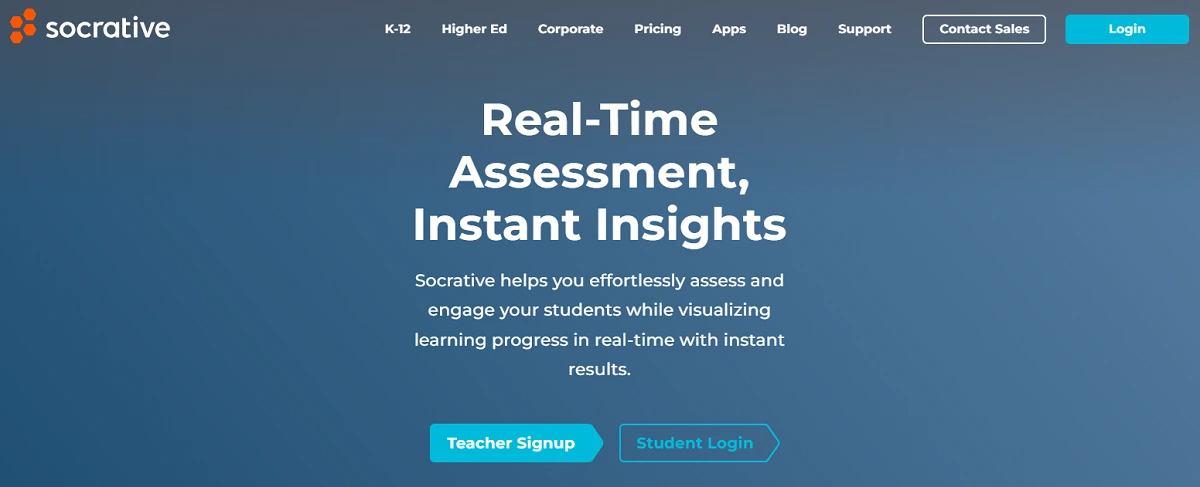
Socrative Reviews and Testimonials
Socrative gets mixed reviews online. On one hand, teachers say it is very easy to use and fun. For example, users praise the game-like Space Race quiz mode and the instant feedback it gives. Many note students can join on any device for free. In Capterra and G2 reviews, educators highlight that Socrative lets them quickly create quizzes and see results in real time. Students enjoy the colorful answer display and the team competition in Space Race.
On the other hand, many users complain about pricing and locked content. Trustpilot reviewers (rating 1.9/5) say Socrative suddenly raised its fees and then disabled older quizzes if you don’t renew. One teacher reported their price jumped from about $62 to $200 per year. After the change, some teachers lost access to old reports. Other negatives include a very limited free plan (only 5 quizzes and 50 students per quiz) and a lack of advanced question types for higher-level math or science. Some call the interface a bit dated and wish it had more game options.
So, is Socrative legit? Yes, it is a real product by a known edtech company. It’s popular in classrooms worldwide. However, recent user feedback is mixed: many enjoy its simplicity and instant grading, but several have been frustrated by the price hikes and feature limits. Overall, Socrative works well as a quiz tool, but its value depends on your needs.
Socrative Pricing
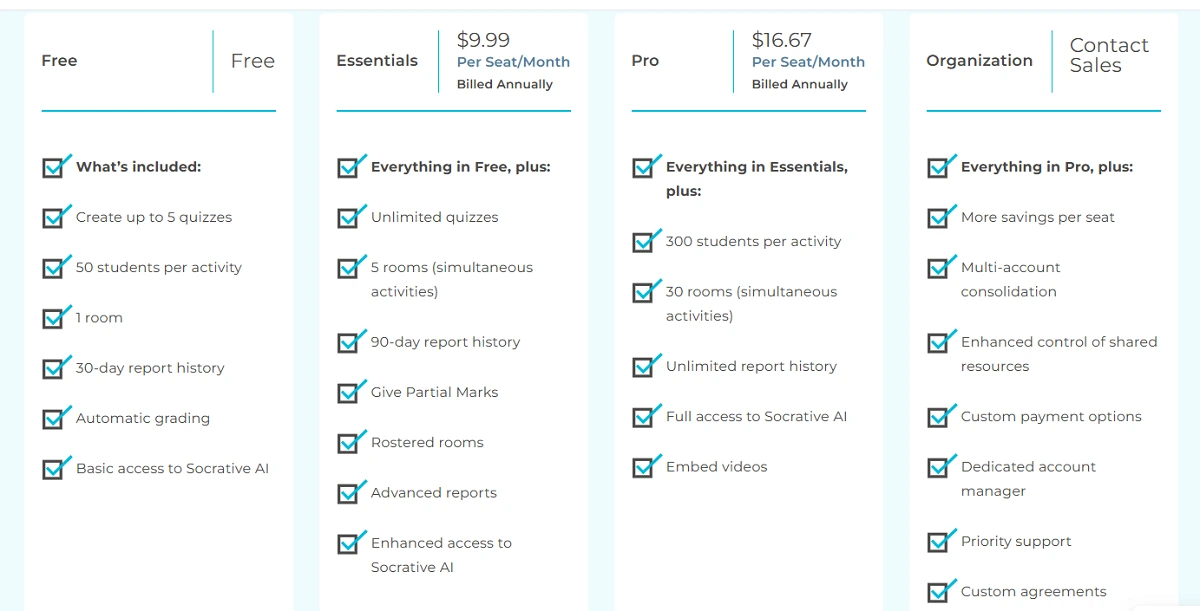
Pricing Range
Socrative’s pricing is based on paying per teacher (called “seats”), not per hour. The main plans are:
- Free: Allows creation of up to 5 quizzes, 50 students per quiz, 1 active room, 30-day history.
- Essentials: $9.99 per teacher per month (billed yearly). Includes unlimited quizzes, 5 active rooms, 90-day history, and extra features like partial grading and rostered classes.
- Pro: $16.99 per teacher per month (billed yearly). Adds support for 300 students per quiz, 30 rooms, unlimited history, a dedicated account manager and priority support.
In other currencies, this is roughly £8 or AU$16 for Essentials, and £14 or AU$27 for Pro each month. School or district plans can save more (volume discounts start at 3 teachers). Note that Socrative charges by teacher seats, not per student, and it requires annual payment by credit card. (So there is no concept of “per-hour” fees for tutoring subjects.)
What Students Say About Pricing
Most pricing comments come from teachers or parents. On forums and review sites, some users were shocked when Socrative’s price jumped dramatically. A teacher on Reddit noted it cost about $100 per year with no free trial, and only learned about the charge after signing up. Comparisons to typical tutor rates show Socrative is inexpensive if a teacher uses it for many students, but those price hikes made it a bad value for some schools. In general, parents see Socrative as cheaper than private tutoring (tutors often charge $20–$50/hour), but they also note it isn’t direct tutoring — it’s a classroom tool. Some say Socrative is worth it for the free student access and tech support, but others feel hidden after buying (see below).
Hidden Costs
Socrative’s official plans have no extra “hidden” fees beyond the subscription. However, users have reported what feel like hidden costs in practice. For example, if you only need the free plan and then later upgrade, you must pay for the full year of Essentials or Pro. After the price change, some people said their old quizzes were “locked” unless they paid the new higher fee. In effect, this meant losing content unless you subscribed at the higher price. There are no cancellation charges; you can switch plans or stop any time. Just be aware: if you let a paid plan expire, you lose the extra rooms and history (and any content stored only online) until you pay again. In short, watch the billing dates and know that skipping renewals can limit what you can do with Socrative.
How Pricing Works
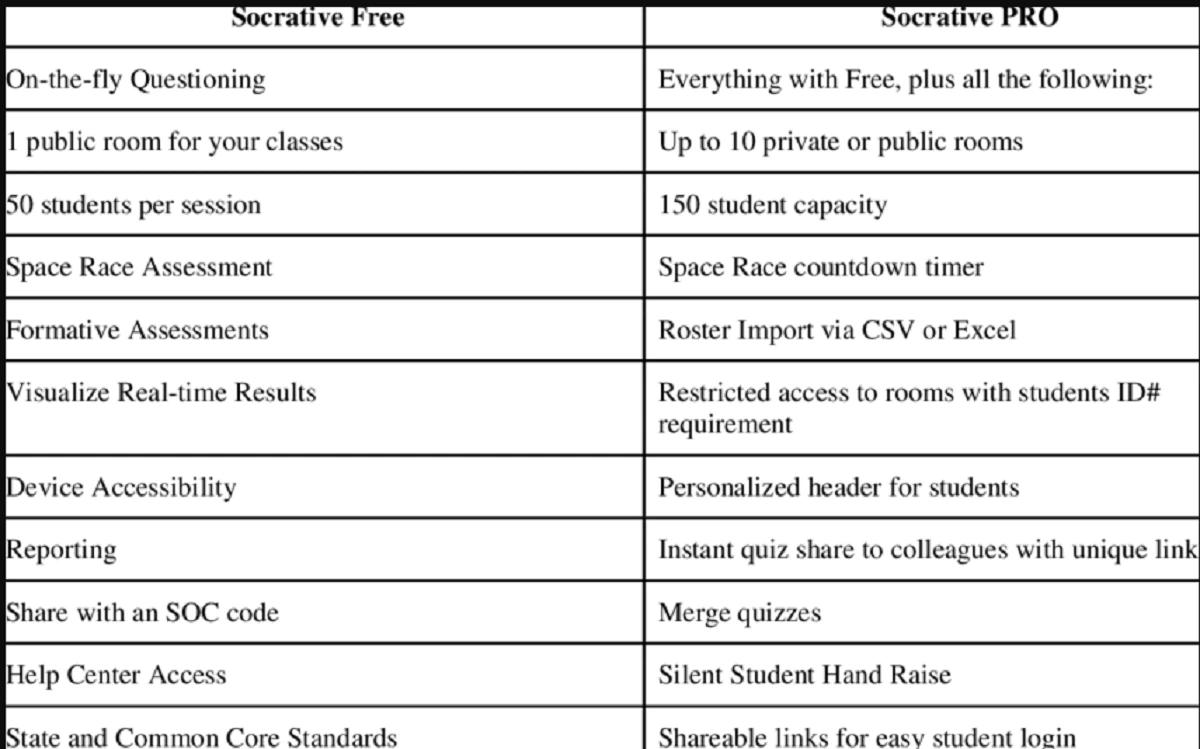
Socrative requires an annual subscription (no month-to-month billing on Essentials or Pro). You pay by credit card when you sign up for a year. Some schools arrange group purchases. No promo codes are widely advertised, but you might save by buying multiple seats or school licenses. They do not usually offer a monthly pay-as-you-go like a tutor site would. If you want to upgrade or downgrade mid-plan, you pay only the difference. There are no setup fees or platform fees beyond the seat price. Essentials and Pro automatically renew each year unless cancelled.
Free Trial
Socrative offers a 21-day free trial for new users to test a paid plan. During the trial, you get all Essentials or Pro features (depending on which you select). You must enter a credit card, and if you don’t cancel before 21 days, the card will be charged for the annual plan. The official policy says you can get a full refund if you forgot to cancel within 9 days of the charge. Beyond that, refunds follow the 30-day rule below. So you can essentially try it free for 3 weeks and back out soon after if it’s not working for you.
Refund Policy
Socrative’s refund policy is straightforward: for individual subscriptions (teachers buying 1–2 seats), you can request a full refund within 30 days of the first payment. If you miss that window, no refund will be given. For trials that convert to paid, the same 30-day limit applies. For school or district purchases, you have 15 days to get a full refund. After any of these windows, the company will not give money back (though they may offer account credit if you up/downgrade plans). User reports on Trustpilot suggest refunds are rarely an issue in practice (aside from trial cancels), but it’s wise to act quickly if you change your mind. At least one teacher said he did get his money back after 2 days. Overall, Socrative will not refund after 30 days of payment, so consider this when signing up.
Socrative Alternatives
Many other online education platforms exist. Here are some strong alternatives, including My Engineering Buddy, Chegg, Khan Academy, and Skooli. Each is quite different from Socrative (which is mainly a quiz tool), so we compare their pricing, subject range, and ease of use below:
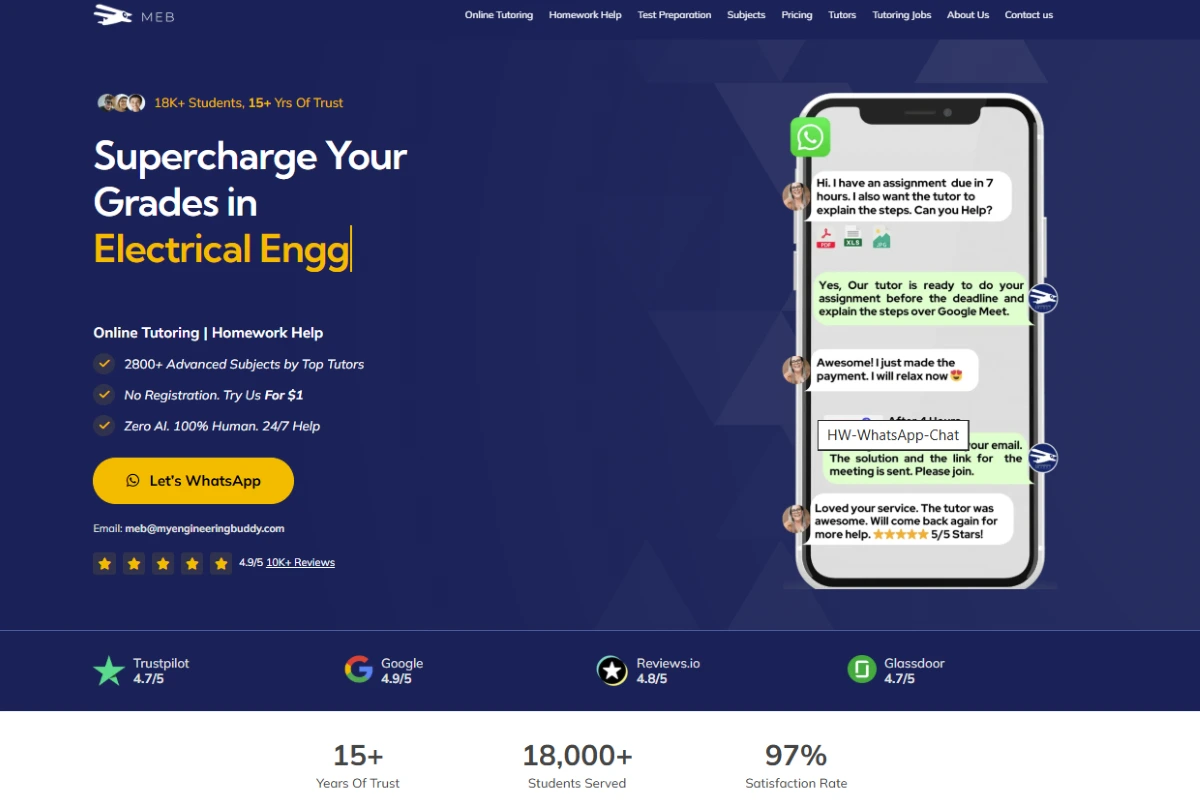
My Engineering Buddy
Cost: Tutoring starts at $20 per hour. No free plan, but they often offer a first session or homework question for $1.
Subjects: Focuses on math, physics, and engineering topics. They list “2800+ advanced subjects” taught by top tutors. It’s meant for high school and college level.
Ease of use: Students simply sign up and ask questions or book sessions via their website. A live tutor works with you one-on-one. There is a 24/7 help chat and a promise to match you with the right tutor quickly.
Tutor quality: MEB hires “top tutors” with strong credentials. Their site shows a 4.9/5 Google review rating, 97% satisfaction, and testimonials from tutors and students. Tutoring is personal and interactive, which is very different from Socrative’s automated quizzes. According to reviews, MEB tutors praise the company’s fair pay and support. The site also highlights a “founder’s guarantee” of high quality. In summary, My Engineering Buddy is a live tutoring service (especially for engineering and science) that offers in-depth help at a higher hourly rate, whereas Socrative provides basic classroom quizzes with no human tutors.

Chegg (Study)
Cost: Chegg Study costs around $15 per month (some regions charge about £10 or AU$20) for unlimited access to textbook solutions and Q&A help. Chegg also has a separate tutor chat service, but tutors set their own rates (often $30–$60 per hour).
Subjects: Covers a wide range, including math, science, computer science, engineering, and more. You can search for solutions to homework problems or ask questions from many textbooks.
Ease of use: Chegg offers a website and app. You post your question and get answers from experts or peers. There is also live chat with a tutor if you pay extra. This is different from Socrative’s in-class quiz system: Chegg is more of a self-study tool.
User feedback: Chegg gets mixed reviews. Some students love it for quick answers. In a Trustpilot review, one user said Chegg gave a correct solution to an electrical engineering problem after they paid for a month. Others complain about unexpected charges and poor customer support. Unlike Socrative, Chegg sometimes surprises people with recurring payments, so check cancellation rules. Chegg does not quiz students; it provides solutions and explanations. It’s good for homework help but not for live practice quizzes.
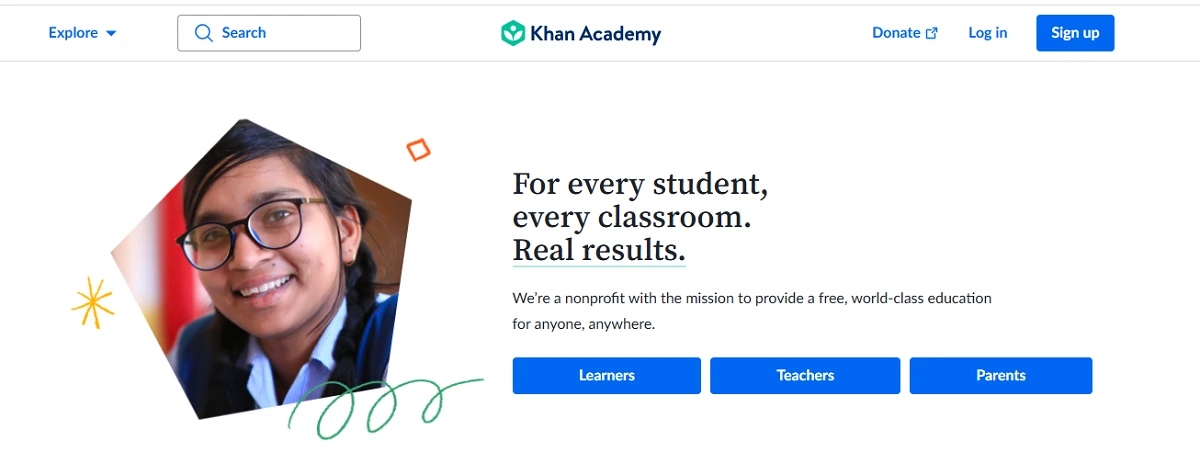
Khan Academy
Cost: Free. Khan Academy is a nonprofit. There is no payment or subscription. Students can use it at no cost.
Subjects: Offers thousands of video lessons and exercises in math, science, art, economics, computing, history, and more. It spans from early grades up through SAT/ACT prep. It covers many topics that Socrative’s quizzes might test, but Khan is self-study.
Ease of use: Khan Academy has a very simple website and app. Students can choose topics and watch short videos, then practice problems. It tracks progress with points and badges. Unlike Socrative, it does not require a teacher or classroom. There are no tutors; learners study on their own.
Tutor quality: There are no live tutors. All instruction is via high-quality videos created by experts. Reviews of Khan Academy (3.6 stars on Trustpilot) praise its clear teaching and large content library. In comparison to Socrative, Khan Academy is a self-paced learning platform – great for independent learning, but it doesn’t have interactive tutors or one-on-one help.
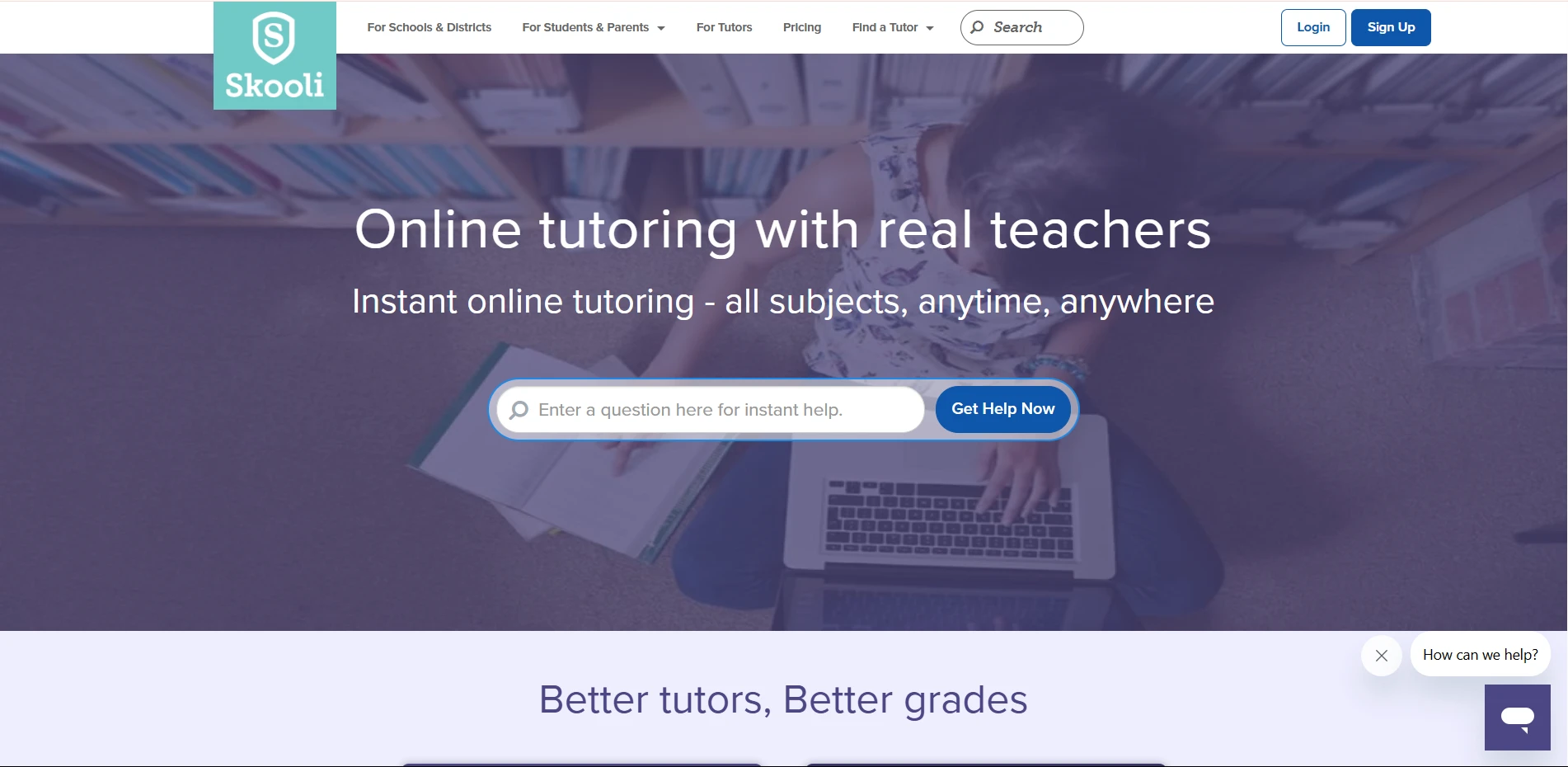
Skooli
Cost: Pay-as-you-go. Skooli charges by the minute (around $0.65–$0.82/minute). At their standard rate, 60 minutes costs ~$49. There is no subscription, so you pay only when you have a session. A 15-minute session costs about $12.
Subjects: Focuses on K-12 math and science, including algebra, chemistry, calculus, physics, and some test prep. Tutors often have teaching credentials.
Ease of use: Sign up for free, then you can instantly connect with a tutor. No scheduling is needed; you pay for each live session. The Skooli online classroom is simple and works on computers and tablets. This is different from Socrative’s quiz app; here a real tutor guides you through problems.
Tutor quality: Reviewers note that Skooli tutors are “highly qualified” – many have master’s degrees. This suggests good tutor quality, though it comes at a price. A Skooli review says it is “very flexible” with its per-minute payment model. However, because you pay by the minute, a long session can get expensive. By comparison, Socrative has no tutors at all. If you need live help, Skooli can provide it (but for higher cost). If all you need is instant feedback in a quiz, Socrative might be enough.
How Socrative Works
For Students
Students do not search for tutors on Socrative. Instead, Socrative is used in class. To join a Socrative session, a student just goes to the Socrative website on a computer or phone (no app required) and clicks “Student Login.” Then they type in the Room Name given by their teacher. This immediately connects them to the live quiz or activity. The teacher runs the quiz from their own account, and students answer questions in real time. You do not book sessions or choose topics yourself; it’s controlled by the teacher. In short, Socrative is free for students, and it works like a digital worksheet. Once the session ends, students might get instant score reports or go on to their next class. There is no tutor matching or payment on the student side, just an easy login with a code.
For Tutors (Teachers)
Socrative doesn’t hire tutors or tutors don’t have personal accounts to offer help. Instead, teachers (or “tutors” in a broad sense) sign up on socrative.com to use the tool. You can sign up for a free Socrative account at any time, or start a trial of Essentials/Pro to unlock more features. Once logged in, a teacher creates quizzes, polls, or games and then shares the room name with students. There is no marketplace or profile for tutors. In contrast, on a platform like My Engineering Buddy, tutors actually apply for jobs. For example, MEB has a “Tutoring Jobs” page where new tutors can become a tutor and start earning (MEB advertises starting rates around $20/hr). MEB tutors have reported good pay and support – one said “Awesome Payments, transparent management”. Socrative, on the other hand, simply provides the quizzing software for free; there is no payment per session for teachers.
Socrative Company Information
Founding and Vision: Socrative was created in 2010 by Michael West and Benjamin Berte in Salt Lake City, Utah. It is run by MasteryConnect (a K-12 company) and was later acquired by Showbie in 2018. Socrative’s mission is to help teachers connect with students in real time, using fun and effective tools to gauge learning. In its own words (via Showbie), Socrative aims to provide “fun and effective tools” so teachers can modify instruction on the fly.
Scale of Operations: Socrative has been very popular in education. By 2013, teachers and students had answered 116 million questions in Socrative quizzes. The platform grew fast: Tracxn reports that over 3.2 million teachers and students had created more than 278,000 quizzes by mid-2013. Today, Showbie says Socrative is used by about 3.7 million educators worldwide. Being part of Showbie means Socrative inherits a global reach: Showbie had 3 million users in 140 countries and supports 14 languages. In practice, Socrative is used in many English-speaking countries (US, Canada, UK, Australia, etc.) but can technically be accessed anywhere with internet.
Services and Subjects: Socrative does not tutor in specific subjects; instead it supports quizzes in any subject. Teachers can make questions for math, science, history, language arts, or any topic. It excels at basic K-12 subjects, with question types for true/false, multiple-choice, and short answer. Recent updates even allow math formulas (with the equation editor) and embedded video links. However, Socrative is not designed for advanced coursework (like college engineering problems) – it simply runs the quizzes teachers create. There is no homework solving or personalized tutoring provided by Socrative itself.
USP of Socrative
- Easy to Use: Many users find Socrative very simple. Teachers say they can set up quizzes and polls quickly, without training. The student interface is straightforward (even young students can join a quiz with one code).
- Multiple Activity Types: Socrative supports quizzes, quick questions, exit tickets, and a fun Space Race game. These varied modes keep students engaged. For example, Space Race lets teams compete to answer correctly, making learning feel like a game.
- Real-time Feedback: It shows instant results to teachers. As students answer, Socrative automatically grades objective questions and tallies scores. This instant feedback is a big advantage: teachers can see who needs help right away and adjust lessons on the spot. Students also see correct answers quickly, which helps learning.
- Mobile and Cross-Device: Socrative works on all devices – laptops, tablets, smartphones. Students don’t need a specific app; they just visit the website. This makes it easy for any class with mixed technology to participate. Many reviews note it worked well on mobile phones in class.
- Data Tracking and Reports: It keeps organized records. Teachers can export results to email or Google Drive. The paid plans even provide advanced analytics and export options. This helps teachers track progress over time, which is important in standards-based schools.
- Basic AI Tools (New): The newest plans include a Socrative AI assistant for quiz creation and grading. The free plan has “basic” AI access, Essentials has “enhanced” AI, and Pro has “full” AI. This shows Socrative is starting to use AI to help teachers make questions, although it’s very new. Because this is recent, there are not many user reviews on it yet.
Reviews generally confirm these USPs. Many praise the intuitive design and variety of quiz types. The free access for students is widely appreciated. On the downside, some USPs seem only partially true – for example, early reviews complained that Socrative needed better math symbols (though the latest version now adds an equation editor). Also, while it tracks data, some say the free report history (30 days) is short if classes need long-term records. Overall, Socrative’s selling points hold up: it’s a simple, engaging classroom quiz tool.
Drawbacks of Socrative
- Pricing and Locked Content: As mentioned, Socrative’s biggest complaint is cost. After a large increase, many teachers felt they were paying too much. Associated with this, users noted that if they cancel or downgrade, their saved quizzes and reports could become inaccessible (locked). This “grudge” by Socrative upset some long-time users.
- Limited Free Version: The free plan is very basic. You can only make 5 quizzes ever and have 1 room open. For big or busy classes, that’s often not enough. Many educators pointed out they had to upgrade to even do a full lesson. Compared to other free tools, Socrative’s free tier is quite restricted.
- Not Tutor-Focused: Socrative is purely a quiz maker. It cannot replace a real tutor. If a student needs step-by-step help or problem-solving advice, Socrative alone won’t provide it. Critics note that for complex subjects (like advanced math or science), Socrative doesn’t teach concepts, it only quizzes what the teacher already taught. So it’s not useful for self-study – it only works when guided by a teacher.
- Feature Gaps: Early reviews listed missing features. For example, it didn’t originally support drawing or chemistry equations, though these have been improved now. Some teachers wanted better integration with gradebooks or LMS (it still has no automatic sync with Google Classroom). Others said the UI feels plain compared to newer apps. So while Socrative does the essentials, it lacks some of the polished features seen in competing platforms.
Comparison with My Engineering Buddy
My Engineering Buddy (MEB) is a very different type of service. Socrative is free or cheap but offers only automated quizzes in class. MEB is paid one-on-one tutoring in specialized subjects. If you are studying engineering or advanced math, MEB’s tutors can work through problems step-by-step, while Socrative cannot. The MEB site advertises “2800+ advanced subjects by top tutors”, showing its depth. MEB also touts high satisfaction ratings (4.9/5 on Google) and a money-back guarantee. This suggests it delivers the personalized help Socrative does not. On cost, MEB is more expensive (around $20/hour) versus Socrative’s fixed monthly fee. But for actual tutoring in tough topics, MEB is geared for results. In reviews, users find Socrative great for quick class check-ins but point out it’s “basic” for deeper learning. Meanwhile, MEB’s reviews highlight thorough help and qualified tutors. In summary, use Socrative for fun quizzes or practice, but turn to MEB (or another live tutor) for personalized instruction and complex homework help.
Customer Support and Policies
Socrative does not list phone or live chat support for free users. Paid plans include email support and the Pro plan has priority help and a dedicated rep. The refund policy we covered allows refunds within 30 days. In online feedback, we did not see many reports about Socrative support response. By comparison, at My Engineering Buddy, tutors report a very responsive support. One tutor review praised “24/7 helpline” and fast refunds. MEB even advertises a money-back guarantee if you are not satisfied. So, in practice, MEB seems to have stronger customer support policies, whereas Socrative’s support is more basic (email ticket, standard policies). Always check each site’s own policy pages: Socrative’s are on their Help site, and MEB’s are summarized on their website.
Global Reach and Localization
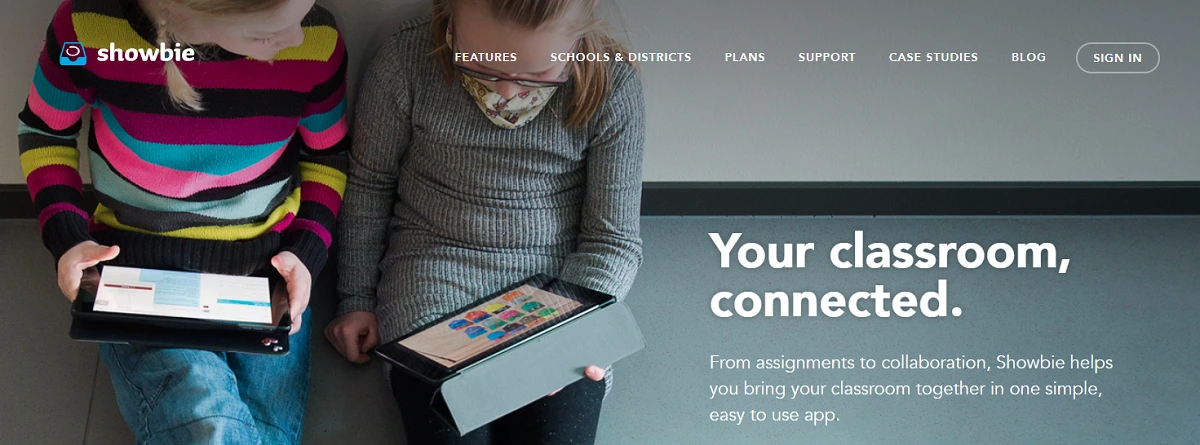
Socrative is used globally. Showbie’s press release notes over 3 million users in 140 countries, and Socrative alone has been used by 3.7 million educators worldwide. It’s available online anywhere, though most content and interface are in English. My Engineering Buddy also serves an international audience. Their site says they help students in the US, UK, Canada, Australia, and many Gulf (Middle East) countries. That implies MEB likely supports multiple time zones and may handle non-English requests as well. In terms of localization, both platforms operate online 24/7. Socrative’s quizzes could be in any language (teacher-made questions), while MEB tutors often speak English, and possibly other languages common in their region. Neither platform seems to have large multi-language interfaces (both are mainly English), but they do reach students in many countries.
Socrative’s Future Plans
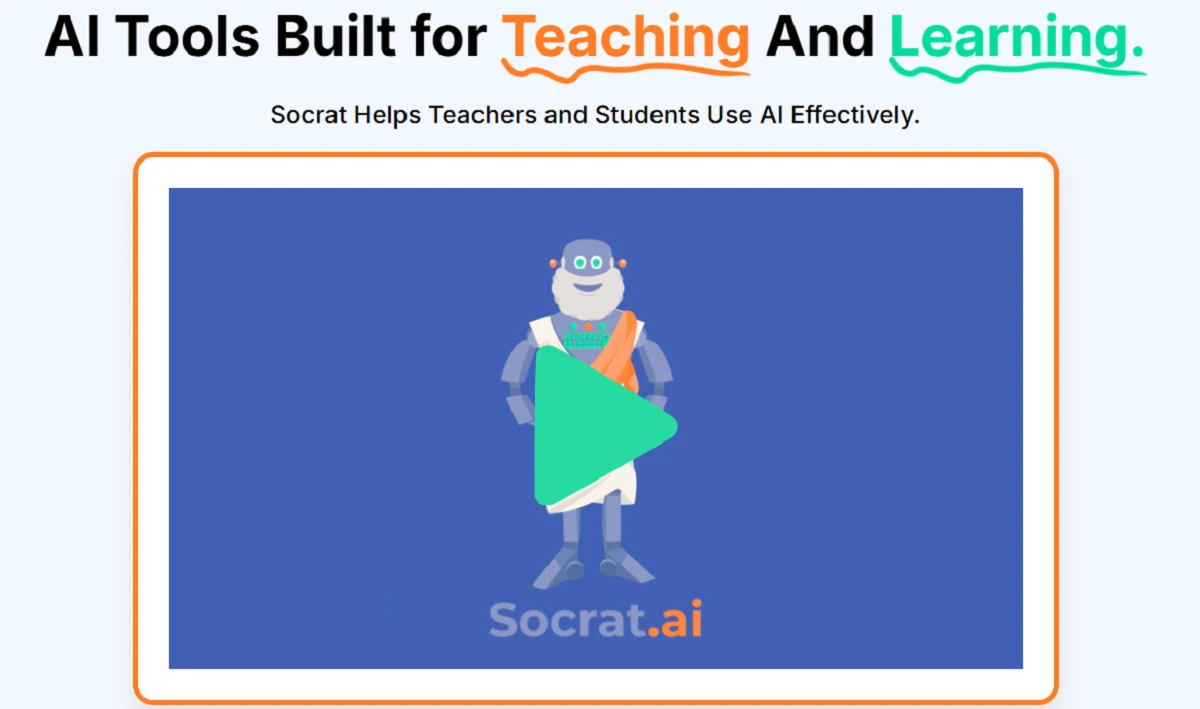
Going forward, Socrative seems focused on adding more tech-driven features. They have already built an AI assistant into their plans, which suggests future use of AI for quiz creation and grading. The team actively updates the platform: for example, in 2022 they added video embedding and better equation support (chemical and math) based on user feedback. The Showbie acquisition announcement hinted at integrating Socrative into a larger suite of classroom tools. We might see deeper Google Classroom/Canvas integration, more interactive question types, and expanded analytics. Socrative’s blog even invites user requests. In sum, expect more AI-powered question features, multimedia support, and possibly collaboration tools (Showbie already emphasizes workflow). But as of 2025, their roadmap points to richer STEM support and faster quiz creation.
FAQs About Socrative
Q: Can tutors set their fee?
Socrative does not have freelance tutors or private tutors at all. It’s just a tool that teachers use. You cannot set any fee on Socrative itself. In contrast, on tutoring sites like My Engineering Buddy, tutors can set their rates (MEB advertises a starting rate of $20/hour).
Q: How much can tutors earn?
Socrative has no direct earnings for tutors (teachers use it as part of their school job). On My Engineering Buddy and similar platforms, tutors typically earn around $15–$30 per hour. MEB shows “Top Tutors, starts USD 20/hr” on their site, and reviewers say the payments are reliable.
Q: Is it easy to get students?
On Socrative, there is no matchmaking – you don’t find students because Socrative isn’t a tutoring marketplace. Students only join classroom activities if invited by a teacher. On MEB, tutors fill in their profile and can be assigned students. MEB claims to serve thousands of students worldwide, so a tutor there can quickly start teaching. In summary, Socrative doesn’t connect tutors and students at all, while MEB handles that matching.
Q: What do tutors like and dislike?
We saw that tutors on MEB appreciated the flexible hours and prompt payments. One said “Awesome Payments, supportive management”. They also liked having a structured system. Some tutors wished for more community support from the company, as noted in reviews. Socrative does not have “tutors” in that sense, so no teacher reviews on Socrative’s Glassdoor or Trustpilot exist. Instead, Socrative’s negatives are mostly from teachers using it in schools, who dislike the price hikes and feature gaps.
Q: How does Socrative compare to My Engineering Buddy?
Socrative is free to try and works in classrooms to give quizzes. MEB, however, is a paid service for one-on-one tutoring. Socrative’s strength is ease of use and quick checks of student understanding. MEB’s strength is expert help on complex homework. If you need guided tutoring in engineering, MEB (or other tutors) is better. If you just want classroom quizzes or self-practice, Socrative might suffice. The two are not the same kind of tool.
Q: Can I get help with a Socrative quiz if I’m stuck?
Socrative itself won’t give step-by-step help – it just tells you right or wrong. If you need help understanding a question, you would seek a tutor or teacher outside Socrative. On My Engineering Buddy, you could even upload the same problem and have a tutor walk you through it (for a fee).
Q: Does Socrative have mobile apps?
Socrative works on mobile phones, but there is no separate app. Students and teachers just use the website or the “Room Name” link in a browser. It’s designed to be touch-friendly, though some may prefer a larger screen for writing answers.
Conclusion
In summary, Socrative is a legit classroom quiz tool with easy features and a fun game mode. Its pros are simplicity, instant feedback, and free student access. Its cons are limited free use and recent price hikes that frustrated some users. If you just need a quick quiz app, Socrative can work. But if you want real tutoring help, a platform like My Engineering Buddy is a stronger choice. MEB offers live tutors in advanced subjects, 24/7 support, and a satisfaction guarantee. We encourage interested students to compare the two: Socrative for classroom drills, and MEB for personalized homework help. Try both for yourself to see which fits your learning style – for example, check Socrative’s free trial and explore MEB’s first-session deal. The right platform depends on your needs, but armed with these facts and reviews, you can make a confident decision.
******************************
This article provides general educational guidance only. It is NOT official exam policy, professional academic advice, or guaranteed results. Always verify information with your school, official exam boards (College Board, Cambridge, IB), or qualified professionals before making decisions. Read Full Policies & Disclaimer , Contact Us To Report An Error

